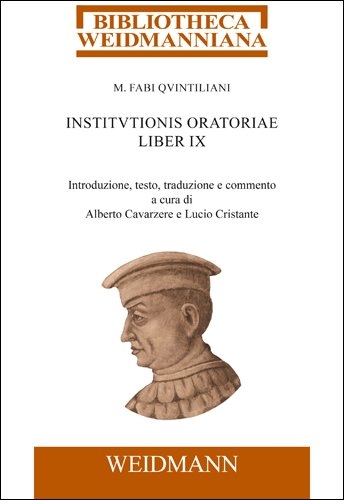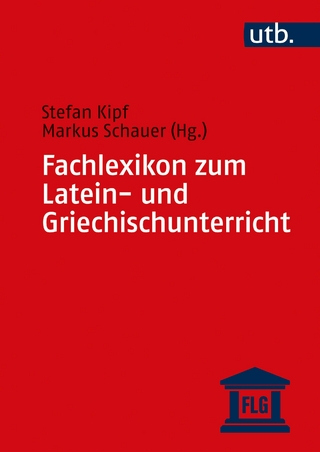
M. Fabi Quintiliani Institutionis oratoriae liber IX
Introduzione, testo, traduzione e commento a cura di Alberto Cavarzere e Lucio Cristante. Tomo II: Commento (IX 3–4) e indici
Seiten
2019
|
2019
Weidmannsche Hildesheim (Verlag)
978-3-615-00440-3 (ISBN)
Weidmannsche Hildesheim (Verlag)
978-3-615-00440-3 (ISBN)
- Titel ist leider vergriffen;
keine Neuauflage - Artikel merken
Meno della metà dei 12 libri della Institutio oratoria di Quintiliano ha un commento scientifico moderno e fra questi il solo libro III è espressamente dedicato all’ars oratoria. Il presente commento del libro IX viene perciò a colmare almeno in parte una lacuna ben presente agli studiosi dell’opera. Entro l’ampia sezione che Quintiliano riserva all’elocutio, il libro IX ha una sua evidente autonomia, dedicato com’esso è alla trattazione delle figurae, della conlocatio e del ritmo oratorio: argomenti che nel quadro della retorica antica trovano qui la più ampia, articolata e lucida esposizione. Il testo latino, che presenta numerose varianti rispetto alle edizioni precedenti, è affiancato dalla traduzione e seguito da un ampio commento filologico linguistico e dottrinale. Quest’ultimo, con la sua dovizia di rimandi e riferimenti bibliografici, mira soprattutto ad aiutare il lettore, non sempre specialista di retorica, a districarsi fra i vari problemi esegetici posti dal trattato di Quintiliano.
***
Weniger als die Hälfte der zwölf Bücher von Quintilians Institutio oratoria verfügt über einen modernen wissenschaftlichen Kommentar. Außerdem ist Buch III erstaunlicherweise das einzige kommentierte Buch der Institutio oratoria, das rhetorische Themen behandelt. Der lang erwartete Kommentar des Buchs IX leistet deshalb einen wichtigen Beitrag zum Verständnis von Quintilians Werk. Buch IX weist vor allem in der breiten, der elocutio gewidmeten Sektion einen hohen Grad an Autonomie auf und bietet die umfangreichste und klarste Behandlung der figurae, der conlocatio und des oratorischen Rhythmus in der Antike. Der neu bearbeitete lateinische Text setzt sich durch die berücksichtigten Varianten ab von früheren Editionen. Darüber hinaus liegen eine italienische Übersetzung sowie ein philologischer, sprachlicher und erläuternder Kommentar vor. Insbesondere wendet sich der mit vielen Querverweisen und einer reichen Bibliographie versehene Kommentar an einen Leserkreis von Nicht-Spezialisten der römischen Rhetorik, dem die komplexen exegetischen Probleme des Werkes erklärt werden.****************Less than half of the twelve books of Quintilian’s Institutio oratoria is provided with a modern scientific commentary. What is more, the only commented book of the Institutio oratoria that actually regards rhetoric is book III. The present commentary of book IX is therefore a long-awaited contribution to understanding Quintilian’s oeuvre. Within the wide section that Quintilian devotes to the elocutio, book IX presents significant elements of autonomy and offers the widest, most articulated and clearest treatment of the figurae, the conlocatio and the oratorical rhythm in antiquity. This book offers a new Latin text with numerous variants in comparison with previous editions, an Italian translation and a wide commentary concerning philological, linguistic and cultural aspects. In particular, the commentary, completed with a large number of cross references and a rich bibliography, addresses non-specialists of ancient rhetoric and aims to solve the intricate exegetical problems posed by Quintilian’s book.
***
Weniger als die Hälfte der zwölf Bücher von Quintilians Institutio oratoria verfügt über einen modernen wissenschaftlichen Kommentar. Außerdem ist Buch III erstaunlicherweise das einzige kommentierte Buch der Institutio oratoria, das rhetorische Themen behandelt. Der lang erwartete Kommentar des Buchs IX leistet deshalb einen wichtigen Beitrag zum Verständnis von Quintilians Werk. Buch IX weist vor allem in der breiten, der elocutio gewidmeten Sektion einen hohen Grad an Autonomie auf und bietet die umfangreichste und klarste Behandlung der figurae, der conlocatio und des oratorischen Rhythmus in der Antike. Der neu bearbeitete lateinische Text setzt sich durch die berücksichtigten Varianten ab von früheren Editionen. Darüber hinaus liegen eine italienische Übersetzung sowie ein philologischer, sprachlicher und erläuternder Kommentar vor. Insbesondere wendet sich der mit vielen Querverweisen und einer reichen Bibliographie versehene Kommentar an einen Leserkreis von Nicht-Spezialisten der römischen Rhetorik, dem die komplexen exegetischen Probleme des Werkes erklärt werden.****************Less than half of the twelve books of Quintilian’s Institutio oratoria is provided with a modern scientific commentary. What is more, the only commented book of the Institutio oratoria that actually regards rhetoric is book III. The present commentary of book IX is therefore a long-awaited contribution to understanding Quintilian’s oeuvre. Within the wide section that Quintilian devotes to the elocutio, book IX presents significant elements of autonomy and offers the widest, most articulated and clearest treatment of the figurae, the conlocatio and the oratorical rhythm in antiquity. This book offers a new Latin text with numerous variants in comparison with previous editions, an Italian translation and a wide commentary concerning philological, linguistic and cultural aspects. In particular, the commentary, completed with a large number of cross references and a rich bibliography, addresses non-specialists of ancient rhetoric and aims to solve the intricate exegetical problems posed by Quintilian’s book.
| Erscheinungsdatum | 27.09.2019 |
|---|---|
| Reihe/Serie | Bibliotheca Weidmanniana ; XVII.2 |
| Sprache | italienisch; lateinisch |
| Maße | 150 x 210 mm |
| Gewicht | 790 g |
| Einbandart | Paperback |
| Themenwelt | Literatur ► Klassiker / Moderne Klassiker |
| Geisteswissenschaften ► Sprach- / Literaturwissenschaft ► Latein / Altgriechisch | |
| Schlagworte | Commento • Institutio Oratoria • Kommentar • Marcus Fabius Quintilianus • Quintilian • Testo • Text • Traduzione • Übersetzung |
| ISBN-10 | 3-615-00440-X / 361500440X |
| ISBN-13 | 978-3-615-00440-3 / 9783615004403 |
| Zustand | Neuware |
| Haben Sie eine Frage zum Produkt? |
Mehr entdecken
aus dem Bereich
aus dem Bereich
kleines Lexikon deutscher Wörter lateinischer Herkunft
Buch | Softcover (2023)
C.H.Beck (Verlag)
CHF 20,95
Per Aspera ad Astra. Intensivkurs für Studierende zur Vorbereitung …
Buch | Softcover (2023)
Universitätsverlag Winter GmbH Heidelberg
CHF 32,15


